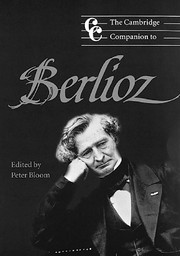Book contents
- Frontmatter
- Introduction: Berlioz on the eve of the bicentenary
- Part I Perspectives
- Part II Principal compositions
- Part III Major writings
- Part IV Execution
- Part V Critical encounters
- 14 Berlioz and Gluck
- 15 Berlioz and Mozart
- 16 Berlioz and Beethoven
- 17 Berlioz and Wagner: Épisodes de la vie des artistes
- Part VI Renown
- Notes
- Bibliography
- Index
17 - Berlioz and Wagner: Épisodes de la vie des artistes
from Part V - Critical encounters
Published online by Cambridge University Press: 28 September 2011
- Frontmatter
- Introduction: Berlioz on the eve of the bicentenary
- Part I Perspectives
- Part II Principal compositions
- Part III Major writings
- Part IV Execution
- Part V Critical encounters
- 14 Berlioz and Gluck
- 15 Berlioz and Mozart
- 16 Berlioz and Beethoven
- 17 Berlioz and Wagner: Épisodes de la vie des artistes
- Part VI Renown
- Notes
- Bibliography
- Index
Summary
Glaub’ mir – ich liebe Berlioz [. . .]: er kennt mich nicht, – aber ich kenne ihn.
(wagner to liszt, 8 september 1852)Wagner est évidemment fou.
(berlioz to his son louis, 5 march 1861)“Au Grand et cher auteur de Roméo et Juliette, l'auteur reconnaissant de Tristan et Isolde” – so reads the dedication on the copy of the full score of Tristan that Wagner sent to Berlioz, on 21 January 1860, accompanied by a brief and touching letter:
Cher Berlioz,
Je suis ravi de vous pouvoir offrir le premier exemplaire de mon Tristan.
Acceptez-le et gardez-le d'amitié pour moi.
A vous.
Richard Wagner.“I am delighted to be able to offer you the first copy of my Tristan,” writes Wagner, who urges Berlioz to accept the score “as a token of friendship.” Such attentiveness is a small indication, I think, that even as a mature composer nearing his forty-seventh birthday, Wagner continued to regard Berlioz, then fifty-six, as his senior and by no means conventionally benevolent colleague. In fact the gift was one of extraordinary generosity, both because this was indeed a first, and rare, pre-publication copy, sent by the publishers to Wagner only one week earlier, and because it was a costly item, whose list price of thirty-five thalers, or one hundred and forty-four francs, was equivalent at the time to the monthly income of many a professor, government functionary, or itinerant musician. What led Wagner to bestow such bounty upon Berlioz? And why, for Wagner, was the Frenchman still the “grand and dear author of Roméo et Juliette” – the now more than twenty-year-old dramatic symphony of 1839?
- Type
- Chapter
- Information
- The Cambridge Companion to Berlioz , pp. 235 - 250Publisher: Cambridge University PressPrint publication year: 2000

